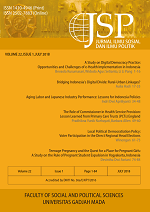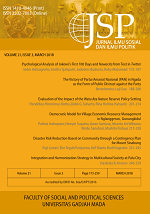Exploring the Structural Spread of Close-Mindedness as an Epistemic Vice in Indonesia
Ferris Arrafi Silitonga(1), Herdito Sandi Pratama(2*)
(1) Magister of Humanities, Universitas Indonesia, Indonesia
(2) Department of Philosophy, Faculty of Humanities, Universitas Indonesia, Indonesia
(*) Corresponding Author
Abstract
The post-Suharto era in Indonesia, which spans over 26 years and encompasses numerous leadership changes, has been marked by significant democratic challenges. The period is defined by the rise of populism, increasing polarization, and institutional resistance to open discourse. Sensitive discussions regarding the principles and ideologies of the state are often met with reluctance or outright rejection by governmental institutions. These tendencies reflect a deeper structural issue: the intellectual vice of close-mindedness, as examined through the lens of vice epistemology. This paper argues that close-mindedness operates not only at an individual level but also as a systemic issue entrenched within institutional frameworks, creating a feedback loop between political structures and societal attitudes. The paper examines the relationship between institutional resistance and societal polarization, shedding light on how these elements reinforce one another. Additionally, it investigates the cultural and historical factors that have contributed to the perpetuation of close-mindedness as an epistemic vice in Indonesia’s governance and political culture. Left unaddressed, this structural vice threatens to undermine the integrity of Indonesia’s democracy and further deepen societal divisions. In its conclusion, the paper offers practical recommendations to break this cycle, emphasizing the need for fostering intellectual humility, strengthening democratic institutions, and encouraging open and critical public discourse to safeguard the nation’s democratic trajectory.
Keywords
Full Text:
PDFReferences
Acikgenc, G. C., & Pratama, H. S. (2018). Public reason and the rise of populism in post- reformation Indonesia. Routledge. https:// doi.org/10.1201/9781315225340
Aristotle. (1996). The Nicomachean Ethics. Wordsworth Classics.
Arif, S. (2018). Polemik Tafsir Pancasila. Koran- Jakarta.com. https://koran-jakarta.com/ polemik-tafsir-pancasila.
Barthes, R. (1972). Mythologies. New York: Hill and Wang
Battaly, H. (2012). Virtue Epistemology. In J. Greco & J. Turri (Eds.), Virtue Epistemology: Contemporary Readings (pp. 639-663). The MIT Press.
Battaly, H. (2016). Developing virtue and rehabilitating vice: Worries about self- cultivation and self-reform. Journal of Moral Education, 45(2), 207–222. https:// doi.org/10.1080/03057240.2016.1195732
Berger, P. L. & Luckmann, T. (1966). The Social Construction of Reality. London: Penguin Books.
Cassam, Q. (2016). Vice epistemology. The Monist , 99 (2), 159–180. https://doi. org/10.1093/monist/onv034
Crouch, H. (1978). The Army and Politics in Indonesia. Cornell University Press.
Fachrudin, A. A. (2018). Polemik Tafsir Pancasila Azis Anwar Fachrudin. Program Studi Agama dan Lintas Budaya, Center for Religious and Cross-cultural Studies (CRCS), Sekolah Pascasarjana Lintas Disiplin, Universitas Gadjah Mada.
Fricker, M. (2021). Institutional epistemic vices: The case of inferential inertia. In I.A. Kidd, H. Battaly, & Q. Cassam (Eds.), Vice Epistemology (pp. 89-107). Routledge.
Hadiz, V. R. (2000). Retrieving the past for the future? Indonesia and the New Order Legacy. Asian Journal of Social Science , 28 (2), 11–33. https://doi. org/10.1163/030382400x00037
Heryanto, A. (2006). State Terrorism and Political Identity in Indonesia: Fatally Belonging. Routledge.
Giddens, A. (1993). New rules of sociological method: A positive critique of interpretative sociologies. Stanford, California: Stanford University Press.
Jenkins, H. (1992). Textual poachers: Television fans & participatory culture. New York: Routledge.
Keum, T. (2020). Plato and the Mythic Tradition in Political Thought. Harvard University Press. https://doi.org/10.4159/9780674250185
Kidd, I. J., Cassam, Q., Battaly, H. (2021). Vice Epistemology. Routledge.
Kidd, I. J. (2019). Epistemic corruption and Education. Episteme, 16(2), 220–235. https://doi.org/10.1017/epi.2018.3
Medina, J. (2021). Capital vices, institutional failures, and epistemic neglect in a county jail. In I.A. Kidd, H. Battaly, & Q. Cassam (Eds.), Vice Epistemology (pp. 108-125). Routledge.
Popper, K. (2002). The Logic of Scientific Discovery. Routledge.
Pratama, H.S. (2018). Urgensi Kebajikan Intelektual di Era Pasca-Kebenaran: Suatu Deskripsi Analitis Melalui Pemikiran Epistemologi Kebajikan Linda Zagzebski. Jurnal Etika Sosial, 23(2). https://doi. org/10.25170/respons.v23i02.554
Zagzebski, L. (1996). Virtues of the Mind: An Inquiry into the Nature of Virtue and the Ethical Foundations of Knowledge. Cambridge: Cambridge University Press.
Article Metrics
Refbacks
- There are currently no refbacks.
Copyright (c) 2025 Jurnal Ilmu Sosial dan Ilmu Politik

This work is licensed under a Creative Commons Attribution-ShareAlike 4.0 International License.






















